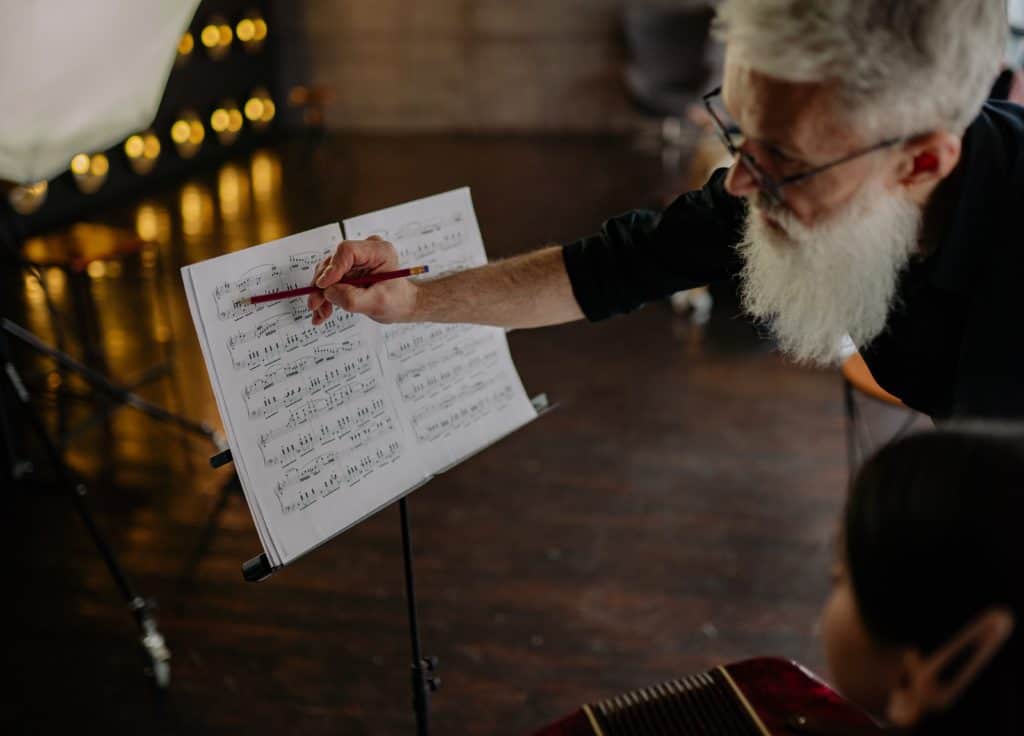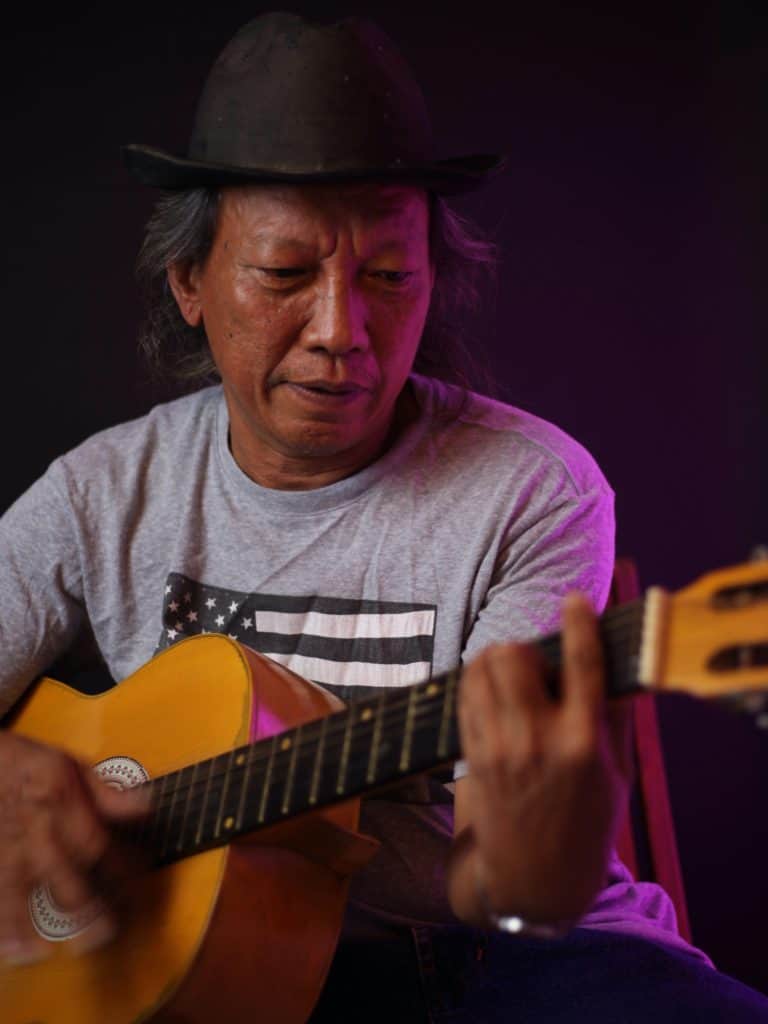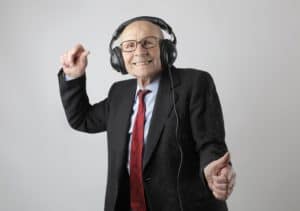Intro
When we look at an old friend or family member with dementia, we might wonder if that person we love is still in there. Could there be some way to reach in and find them? Maybe even release them? Well, that just may be possible through music. There is now clear evidence that music therapy helps dementia patients.
Henry’s Story
The YouTube video “Alive Inside” has become famous. An old man, Henry, slumps in his chair, so lost in dementia that he can’t recognize his own daughter. An aide slips headphones on him, playing songs from when he was young. Within seconds Henry starts to move and sing along. When the headphones are removed, he then talks coherently about how much he loves music and about his favorite musicians.
Elder care facilities are seeing this phenomenon repeatedly. For seniors with dementia, including Alzheimer’s disease, music is therapeutic. It can reduce agitation, foster communication and make it easier for patients to get along with caregivers. In some cases, there’s improved memory recall, a better mood, some social interaction and an improved sense of control over their own lives. Patients seem to recall their biography. They are someone again.
Benefits don’t necessarily stop when the music stops. Sometimes they persist for hours and even days. The music doesn’t necessarily have to be familiar, and the person doesn’t need any knowledge of music or music training to experience these benefits.
How does music therapy help dementia patients? Entitled Power Of Music On The Brain: Dementia & Parkinson’s comes yet another inspiring video studying the jaw-dropping effects of music on dementia and Parkinson patients.
Why Does Music Have an Impact?
Why would music resonate where most other types of stimuli fall on unresponsive ears? According to the director of Boston University’s Alzheimer’s Disease Center, there are two theories. The first is that music is so emotionally laden that it triggers deep emotional memories. These are among the most powerful recollections a human being has, and they can persist when other types of memories have vanished.
The other theory has to do with two types of memory. We have explicit memory (EM), which helps us reason and recall events, and Alzheimer’s destroys EM. But we also have procedural memory (PM), which helps us do repetitive activities, everything from peeling a potato to riding a bicycle. PM is much more resistant to the ravishes of dementia than EM. When we learn music, what we gain is stored as procedural memory, and it remains after most of the explicit knowledge is gone.
It’s further theorized that music activates specific regions of the brain, awakening cerebral networks and prompting them to communicate, possibly aiding attention and motivation.

Evidence That Music Matters
In Practical Neurology, Dr. Ronald Devere director of the Alzheimer’s Disease and Memory Disorders Center in Austin, Texas cites evidence of the usefulness of music in dementia patients in his article “Music and Dementia: An Overview.”
For example, patients who listen to music often smile, move, and dance even when they don’t communicate in any other way. Music can increase heart rate and hormone levels.
Notable is that playing an instrument may be a preventative that slows cognitive decline and decreases the risk of dementia in those who are still healthy. Even for those who can’t play, singing often improves mood, behaviors, and assists cognitive functioning.
For most people, the music they’ve loved helps define who they are. Experiencing that music can help regain personal identity, some life history and provide a sense of self.
Those who have been musicians appear to have a cognitive advantage. Senior musicians typically do better than their peers, not only in auditory function but also in cognitive control. Even people with little musical background improve in these areas after only a short period of musical training. It may be that you’re never too old to learn an instrument – and probably should!
All in all, there’s strong evidence that music therapy is beneficial for dementia patients. Others would go further and say that it’s an absolute necessity for them.

Putting the Evidence to Work
Senior care communities are recognizing the value of music, and more of them are engaging professional music therapists and incorporating music therapy into their care programs.
Much of a music therapist’s work is tailored to an individual. They evaluate a patient and develop a treatment plan which might include listening to music, singing, playing, moving to music, or even creating their own music. Therapists might create playlists designed to promote relaxation or motivation.
However, it doesn’t require a music-oriented professional to help a senior with music. Other staff can arrange concerts and musical events. Family and friends can contribute playlists of music meaningful to their loved ones.
Then there’s active participation in music activities: singalongs and choirs can benefit a wide range of people with various levels of cognitive ability. Such activities are socially constructive because they promote interaction and build relationships among those who are at risk of becoming isolated. Also, singing is a physical boon for the individual. It improves lung capacity, increases blood oxygenation, and promotes alertness.
Not least important, singing with a group is just plain fun and dementia patients can certainly use some fun.
Music Benefits All Seniors 
All older adults can improve their lives with music, not just those with cognitive decline in a care facility. Music is one of the resources that can be a great assist as people transition into old age. The advantages are physical, mental and social.
Music stimulates motivation and energy. Whether you’re walking, stretching, or working out, it’s easier to stay engaged and keep your efforts at an optimum level when your favorite tunes are accompanying you. Using music as a motivator can keep you active thereby helping you maintain muscle strength, cardiovascular fitness and bone density. One might even argue that it improves balance and decreases the risk of falls.
Music can improve your mood whether you’re listening to it or making it yourself. It affects brain chemistry by invoking positive feelings.
When old friends gather, music is often the commonality making good times that much better. People who listen to or play music together build relationships and continue to seek out one another’s company. They avoid the isolation that diminishes the quality of life for so many older people.
The deepest benefits of music are hard to put into words. Sure, there are identifiable physical, mental and relational gains. But more than that, the best music speaks to something deep inside. It stirs us in ways that we feel rather than understand. Our emotional response to music begins in infancy and extends across our entire lifetime.
How does music help dementia patients? It provides a humane, uplifting, drug-free therapy for one of the most heartbreaking conditions seniors and their families can face.

